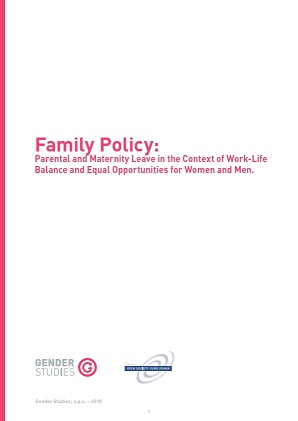Family Policy: Parental and Maternity Leave in the Context of Work-Life Balance and Equal Opportunities for Women and Men
Family Policy: Parental and Maternity Leave in the Context of Work-Life Balance and Equal Opportunities for Women and Men
Author(s): Jiřina Kocourková, Linda Sokačová, Alena Křížková, Hana Maříková, Alexandra Jachanová Doleželová, Kateřina Machovcová
Contributor(s): Linda Sokačová (Editor), Roman Piják (Illustrator)
Subject(s): Governance, Labor relations, Welfare systems, Social development, Family and social welfare, Demography and human biology, Human Resources in Economy, Sociology of Politics, Socio-Economic Research
Published by: Gender Studies, o. p. s.
Keywords: Family policy; parental and maternity leave; work-life balance; equal opportunities; family support; types of partnership; children; parenting support; stimulating birth rate; governance; welfare;
Summary/Abstract: Family policy in the context of parenting and equal opportunities is a system of provisions, programs and policies sharing the common goal of supporting families and other types of partnerships. They are financial, material and legislative instruments that influence people’s decisions about family and having children. The foundation of family policy is the form of maternity and parental leave, possibly including the provision of father leave . The goal of family policy in regard to parenting should be the creation of a family-friendly environment in which people can freely decide whether they want to have children and how many. In such an environment people need not worry about their and their children’s socioeconomic situation and about their future, and can therefore freely decide to have as many children as they really wish. In the long term, this approach to parenting support is more effective than temporary pro-population measures which typically aim to stimulate the birth rate of some age groups but do not create stable conditions for parenting in the long run. Creating and fostering a positive environment is also more useful than implementing policy approaches based on penalizing one-child or childless families as some family policy or retirement concepts propose. Family policy that observes equal opportunities principles and promotes work-life balance, allows for a variety of life strategies both for those who decide to balance work and family as well as for those who prefer to look after their families full-time. Neither social group should be neglected or discriminated against – be it by the system of maternal and parental leave or by an associated policy (the retirement system, for instance), as it happens today. A good system of maternity and parental care is grounded in anti-discrimination principles which actively prevent discrimination of parents and other caregivers and promote equal opportunities. Ideally, a family policy that provides equal opportunities does not support only the types of idealized family units that are in accord with the party lines of the governing political party. On the contrary, a fair family policy understands families are dynamic entities that take many of well-functioning and responsible forms. [...]
Series: Gender Studies
- Page Count: 60
- Publication Year: 2010
- Language: English
- Content File-PDF

